Travelling is one of the most exciting experiences you can have, but it can also be stressful, especially when it comes to keeping your belongings safe. Whether you’re backpacking across Europe or taking a weekend trip to a nearby city, it’s important to take precautions to protect your valuables.
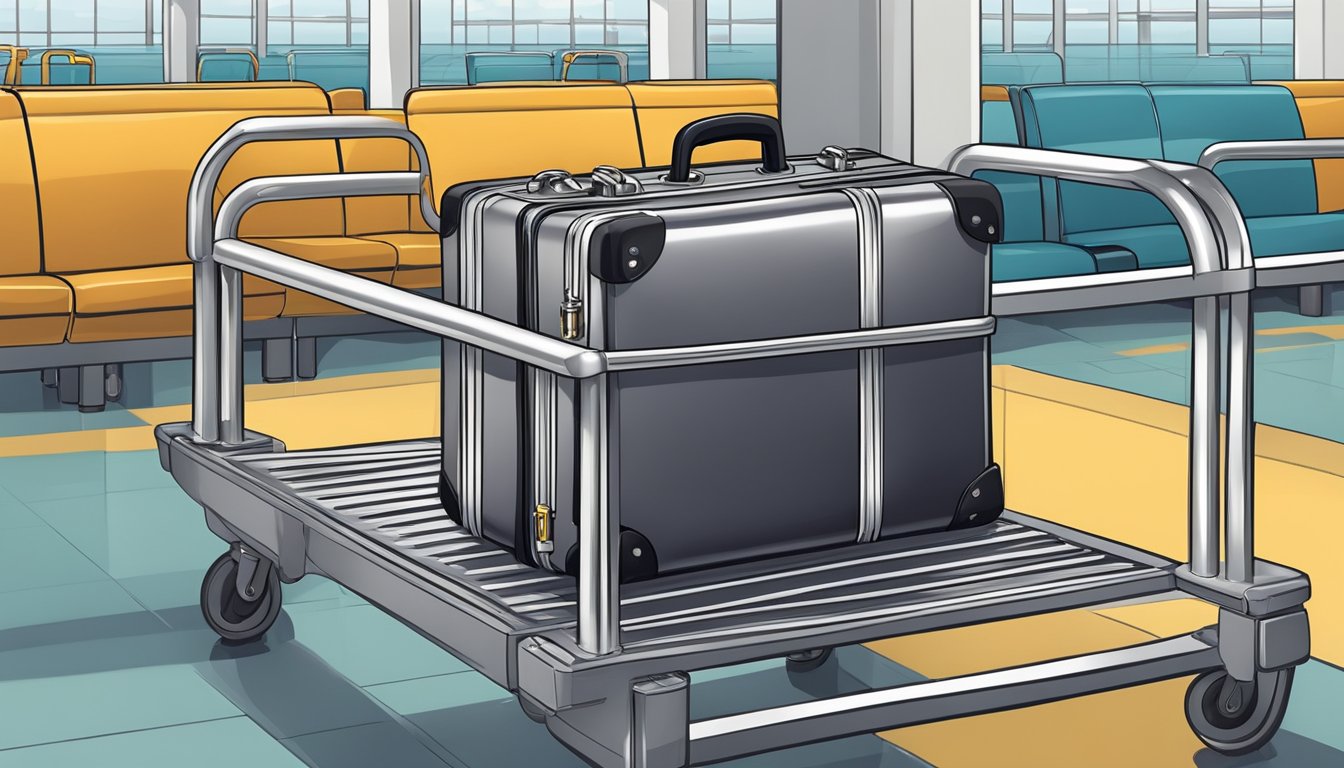
One of the most important things you can do to keep your belongings safe while travelling is to plan ahead. Before you leave, research the areas you will be visiting and find out which ones are safe and which ones are not. This will help you avoid areas that are known for pickpocketing and other types of theft. It’s also a good idea to make copies of your passport, ID, and other important documents and keep them in a safe place.
Another important tip to keep your belongings safe while travelling is to keep them with you at all times. This means carrying your backpack or purse in front of you, rather than on your back, and never leaving your bags unattended. It’s also a good idea to invest in anti-theft gear, such as a slash-proof bag or a lockable backpack, to make it more difficult for thieves to steal your belongings.
1 Min Read
Traveling is a blast, but worrying about your stuff can put a damper on the fun. Here’s the quick guide to keeping your belongings safe:
- Plan Ahead: Research your destination for known scams and high-risk areas. Make copies of important documents and keep them separate from the originals.
- Be Street Smart: Keep your valuables close (think money belt or hidden pouch) and avoid flashy displays of wealth. Invest in anti-theft gear like a slash-proof bag or a lockable backpack.
- Secure Your Stuff: Utilize hotel safes for valuables and consider a portable safe for on-the-go security.
- Tech Savvy: Back up your data before your trip and avoid public Wi-Fi unless you have a VPN.
- In Case of Emergency: Report stolen items to the authorities and have important contacts readily available (embassy, bank, etc.).
By following these simple tips, you can explore with peace of mind, focusing on making memories, not missing belongings.
Understanding the Risks of Travel
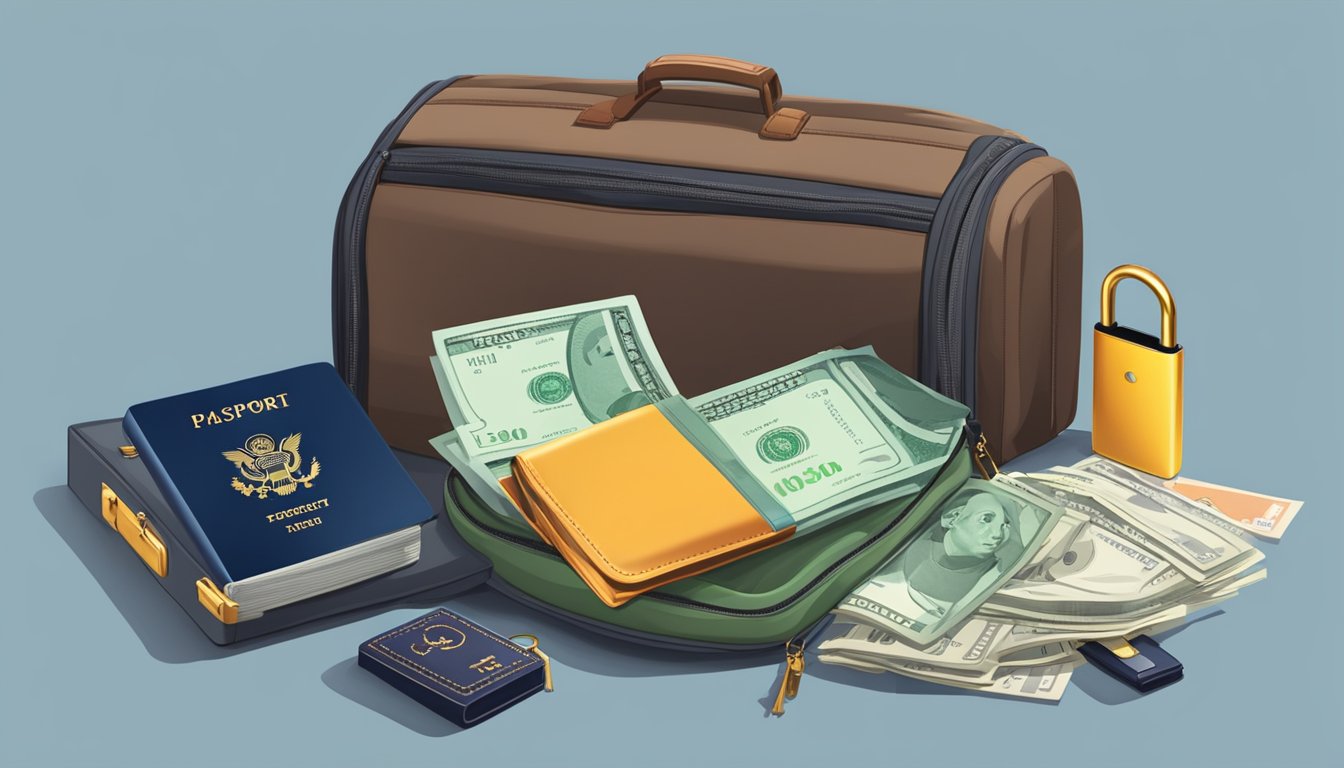
Travelling is an exciting experience, but it also comes with its risks. Before you embark on your journey, it’s important to understand the potential dangers you may face and how to protect yourself and your belongings.
Common Travel Scams
One of the most common risks of travel is falling victim to a scam. Scammers often target tourists who are unfamiliar with the local area and customs. Some of the most common travel scams include pickpocketing, fake tours, and fake police officers.
To avoid these scams, it’s important to be aware of your surroundings and to keep your belongings close. Don’t carry large amounts of cash, and be wary of anyone who approaches you with an offer that seems too good to be true.
Targeted as a Tourist
As a tourist, you may also be targeted by thieves who see you as an easy target. They may try to steal your luggage or other belongings, or they may try to scam you out of your money.
To avoid being targeted, try to blend in with the locals as much as possible. Dress like a local, and avoid carrying expensive items that may draw attention to yourself. It’s also a good idea to be aware of the local customs and to be respectful of the local culture.
Cultural Considerations
When travelling to a foreign country, it’s important to be aware of the local culture and customs. What may be acceptable in your home country may not be acceptable in the country you are visiting.
For example, in some cultures, it may be considered rude to wear shoes inside a home. In others, it may be considered disrespectful to show too much skin. By being aware of these cultural considerations, you can avoid offending the locals and drawing unwanted attention to yourself.
Travel Insurance
No matter how careful you are, there is always a risk of something happening to your belongings while travelling. That’s why it’s important to invest in travel insurance. Travel insurance can help protect you against the financial losses that may occur if your belongings are lost, stolen, or damaged while travelling.
By understanding the risks of travel and taking steps to protect yourself and your belongings, you can enjoy your travels with peace of mind.
Pre-Travel Preparations
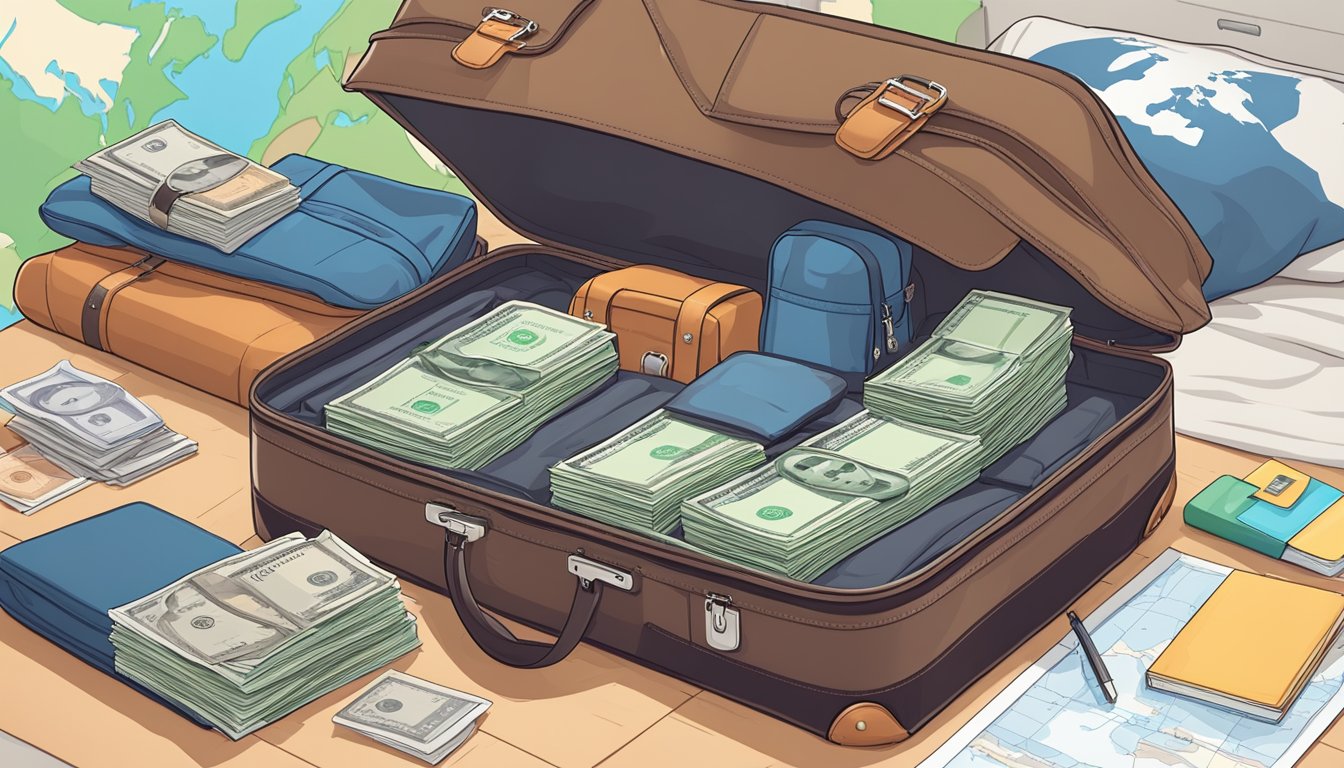
Excited about your upcoming trip? Before you pack your bags, it’s important to take some pre-travel preparations to keep your belongings safe while travelling. In this section, we’ll cover three essential steps to take before you leave: Research Your Destination, Secure Travel Insurance, and Backup Your Important Documents.
Research Your Destination
Before you travel, it’s important to research your destination thoroughly. This will help you understand the local customs, laws and potential risks. You can find information about your destination by visiting travel websites, reading travel guides or talking to other travellers who have visited the same place.
Here are some things to consider when you research your destination:
- Are there any high-risk areas or neighbourhoods you should avoid?
- Are there any cultural norms you should be aware of?
- What is the local currency and exchange rate?
- What is the local emergency number?
Secure Travel Insurance
Travel insurance is essential to protect your belongings and yourself while travelling. It can cover the cost of medical expenses, lost or stolen items, and trip cancellations. Make sure you get a comprehensive insurance policy that covers all your needs.
When choosing your insurance policy, consider the following:
- Does it cover the activities you plan to do?
- Does it cover pre-existing medical conditions?
- What is the excess or deductible?
- What is the maximum coverage limit?
Backup Your Important Documents
Before you leave, make sure to backup all your important documents. This includes your passport, travel itinerary, hotel reservations, and any other important information. You can make photocopies of these documents and keep them in a separate location from the originals. You can also store them on cloud-based services like Google Drive or Dropbox.
Here are some tips for backing up your important documents:
- Make copies of your passport and visa and keep them in a safe place.
- Take a photo of your passport and visa and store it on your phone or in the cloud.
- Email a copy of your itinerary and hotel reservations to yourself so you can access them from anywhere.
By taking these pre-travel preparations, you’ll be well on your way to keeping your belongings safe while travelling.
Packing Essentials
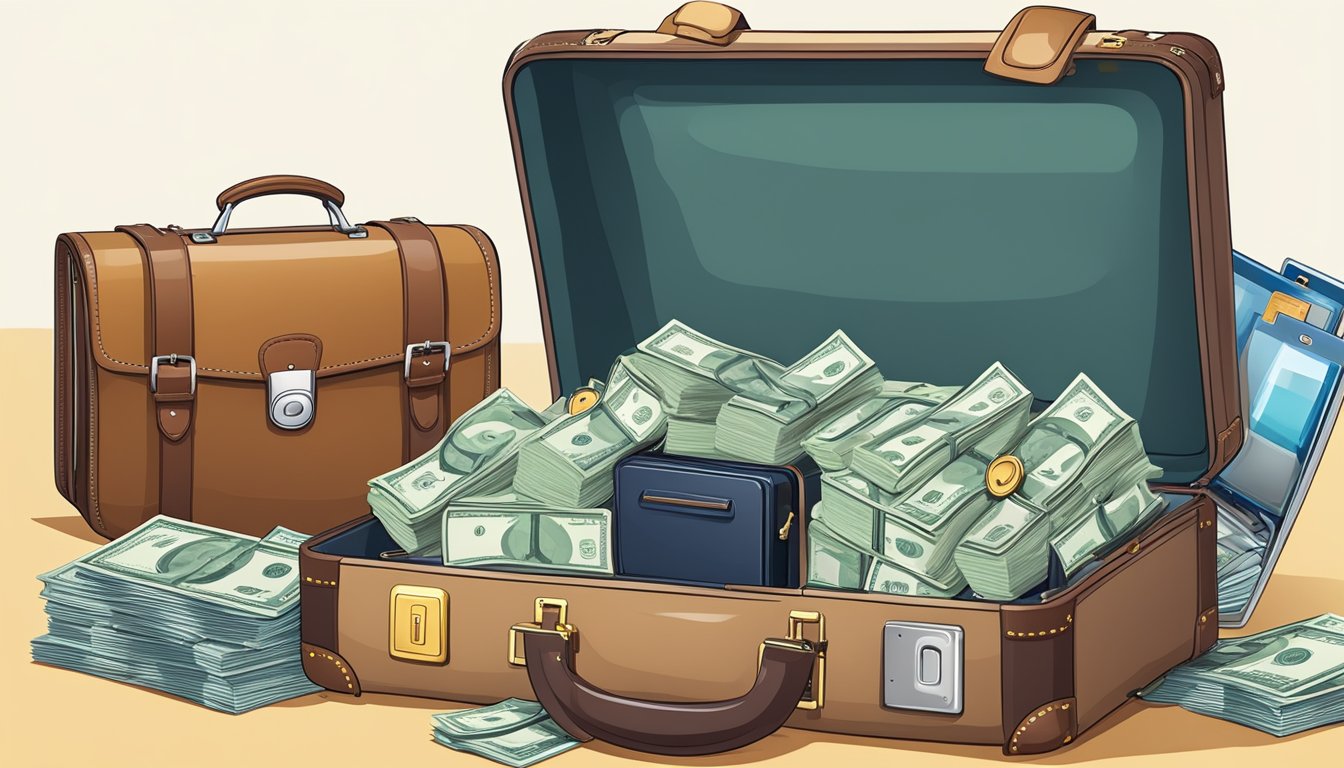
When it comes to keeping your belongings safe while travelling, choosing the right luggage is crucial. Make sure you invest in a sturdy suitcase or backpack that can withstand the rigours of travel. Consider the size and weight of your luggage, as well as its durability and security features.
Choosing the Right Luggage
A hard-shell suitcase is a good choice for protecting your belongings from damage, while a soft-shell suitcase is more lightweight and flexible. If you prefer a backpack, look for one with anti-theft features such as hidden zippers and lockable compartments. Consider the size and weight of your luggage, as well as its durability and security features.
Anti-Theft Travel Gear
Anti-theft travel gear can help keep your belongings safe from pickpockets and thieves. Look for pickpocket-proof clothing that has hidden pockets and RFID-blocking technology to protect your credit cards and passport. An anti-theft bag with slash-resistant fabric and lockable zippers is also a good investment.
Organising Your Belongings
Organising your belongings can help you keep track of everything and make it easier to find what you need. Use packing cubes or compression bags to keep your clothes and accessories organised and compact. A travel wallet or pouch can also help you keep your important documents and money in one place.
Securing Your Valuables
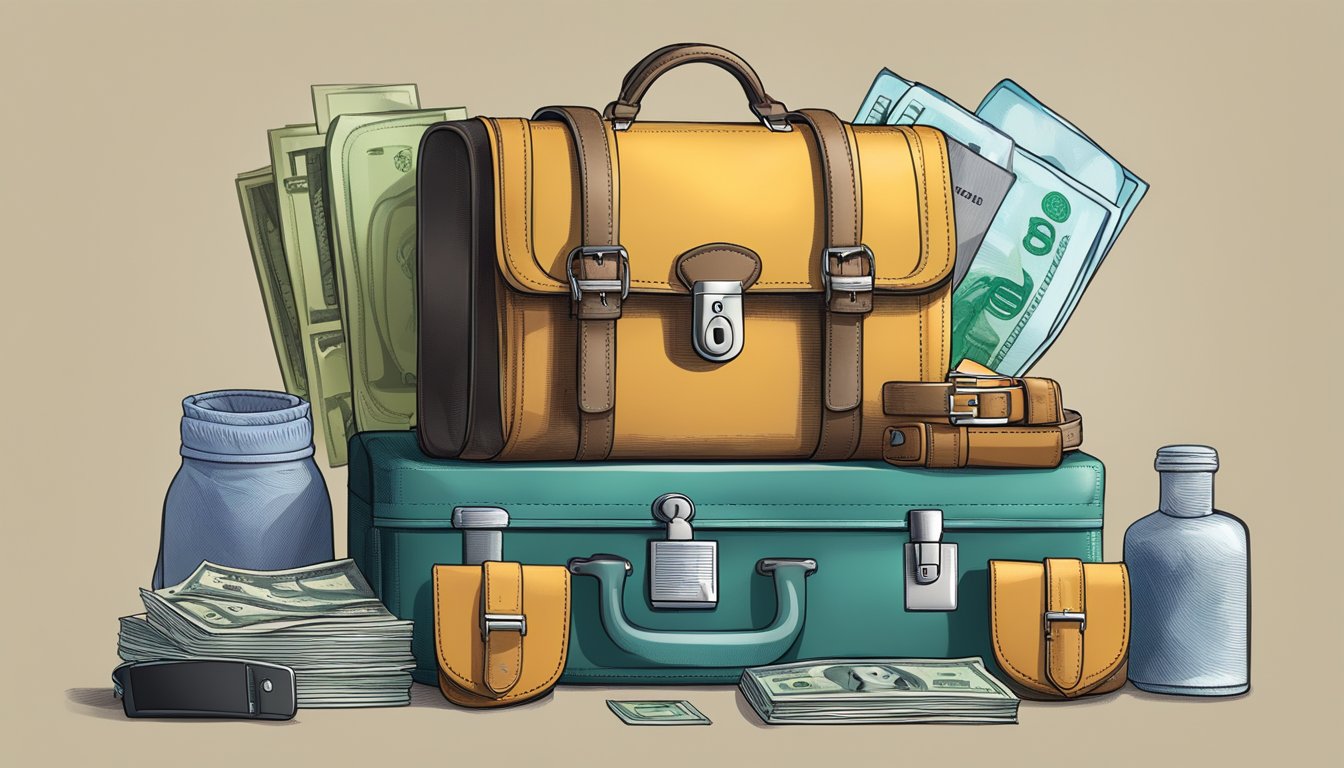
Travelling can be an exciting adventure, but it’s important to keep your belongings safe. Here are some tips to help you secure your valuables and have peace of mind while travelling.
Using Hotel Safes and Lockers
Most hotels provide safes or lockers for their guests to store valuables such as jewellery and passports. Make use of these facilities to keep your belongings safe. When using a hotel safe, make sure to choose a unique combination that is easy to remember but hard for others to guess. Also, make sure to double-check that the safe is locked before leaving your room.
Money Belts and Pouches
Money belts and pouches are a great way to keep your cash, cards, and passport safe while travelling. These items are worn under your clothing, making them difficult for thieves to access. Choose a money belt or pouch that is comfortable to wear and has enough space for your essentials. Remember to keep your decoy wallet in your pocket to avoid drawing attention to your money belt or pouch.
Techniques to Deter Thieves
There are several techniques you can use to deter thieves from targeting you. Firstly, avoid wearing expensive jewellery or carrying expensive items such as designer bags. This can make you a target for thieves. Secondly, be aware of your surroundings and avoid walking alone in unfamiliar areas, especially at night. Thirdly, keep your belongings close to you at all times and avoid leaving them unattended. Finally, consider using a decoy wallet to trick thieves into thinking they have found your valuables.
By following these tips, you can help keep your belongings safe while travelling. Remember to be aware of your surroundings and take precautions to avoid becoming a target for thieves.
Pro Tip: Invest in a Portable Tracker for Peace of Mind
Consider investing in a portable tracker for your luggage! These handy devices use GPS or Bluetooth technology to locate your bags anywhere in the world. Imagine the relief of tracking down a misplaced suitcase or deterring a potential theft altogether. Portable trackers are a valuable addition to any travel arsenal, offering real-time monitoring and added security for your belongings.
Money Management
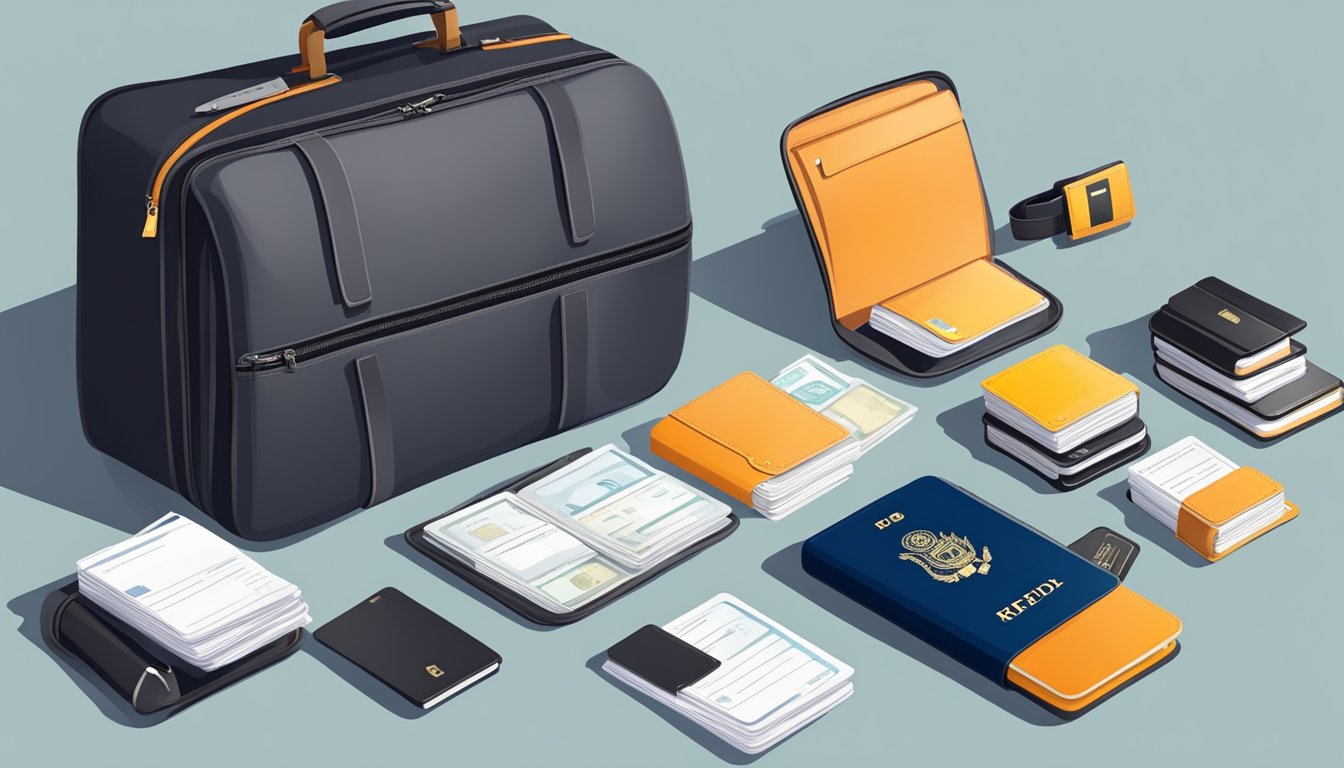
Travelling is an exciting adventure, but it’s important to ensure your money is kept safe and secure throughout your journey. Here are some essential tips to help you manage your finances while on the go.
Carrying Cash and Cards
When travelling, it’s wise to carry a mix of cash and cards. Ensure you have a small amount of local currency for immediate expenses upon arrival. Additionally, carry a travel-friendly wallet that can securely hold your cards and cash, reducing the risk of theft.
Using ATMs Wisely
ATMs are a convenient way to access cash while travelling, but it’s crucial to use them wisely. Only withdraw money from ATMs located in secure and well-lit areas, such as inside banks or reputable establishments. Avoid using standalone ATMs in secluded locations to minimise the risk of theft or tampering.
Splitting Up Your Money
To safeguard your funds, consider splitting your money and cards into separate locations. Keep a portion of your cash and a backup card in a concealed money belt or pouch worn under your clothing. Additionally, leave some money in your accommodation’s safe or hidden luggage compartment as a backup in case of emergencies.
By following these money management tips, you can enjoy peace of mind and focus on making the most of your travel experiences.
On the Move
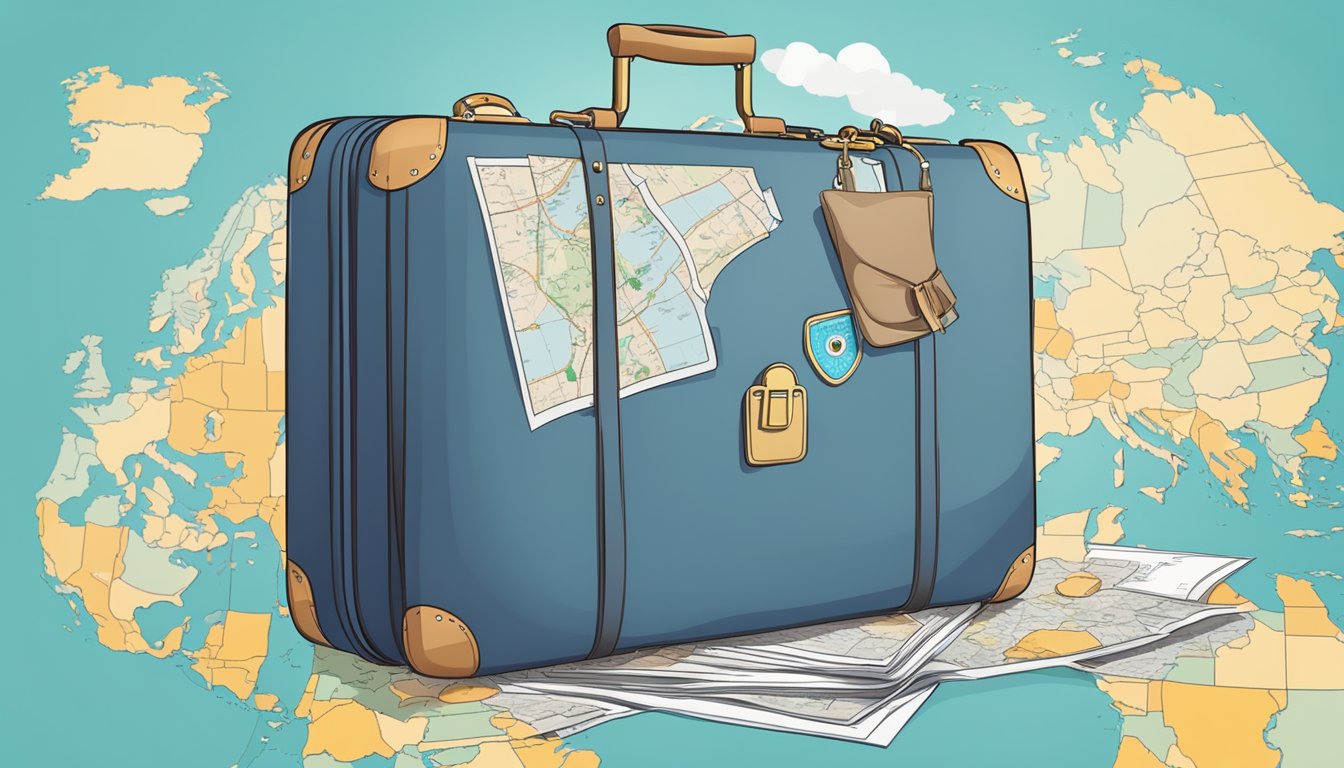
Travelling is exciting, but it comes with its own set of challenges. Keeping your belongings safe while on the move is crucial. Here are some tips to help you stay safe and secure.
Navigating Public Transport
Using public transport can be a convenient and cost-effective way to get around, but it can also be a prime location for pickpockets. Keep your backpacks or hand luggage close to you at all times, and avoid displaying any expensive items. Consider using a lock or a strap to secure your bags to your body or the seat. When travelling by bus, keep your bags on your lap or between your feet.
Staying Alert in Transit
Staying alert while in transit is important. Be aware of your surroundings and keep an eye out for any suspicious activity. If you are travelling by moped or bike, make sure you lock it up securely when you park. When travelling by taxi or ride-sharing service, make sure you check the driver’s ID and the car’s license plate before getting in.
Protecting Your Belongings on the Go
Protecting your belongings while on the go is essential. Consider using a money belt or a hidden pouch to keep your cash and cards safe. Keep your phone and other electronic devices in your pocket or a secure bag. If you are carrying a camera, keep it around your neck or in a bag that is close to your body. If you need to leave your bags unattended, make sure you keep them in a secure location.
Remember, staying safe while travelling is all about being aware of your surroundings and taking precautions. By following these tips, you can enjoy your trip without worrying about your belongings.
Staying Safe in Accommodation
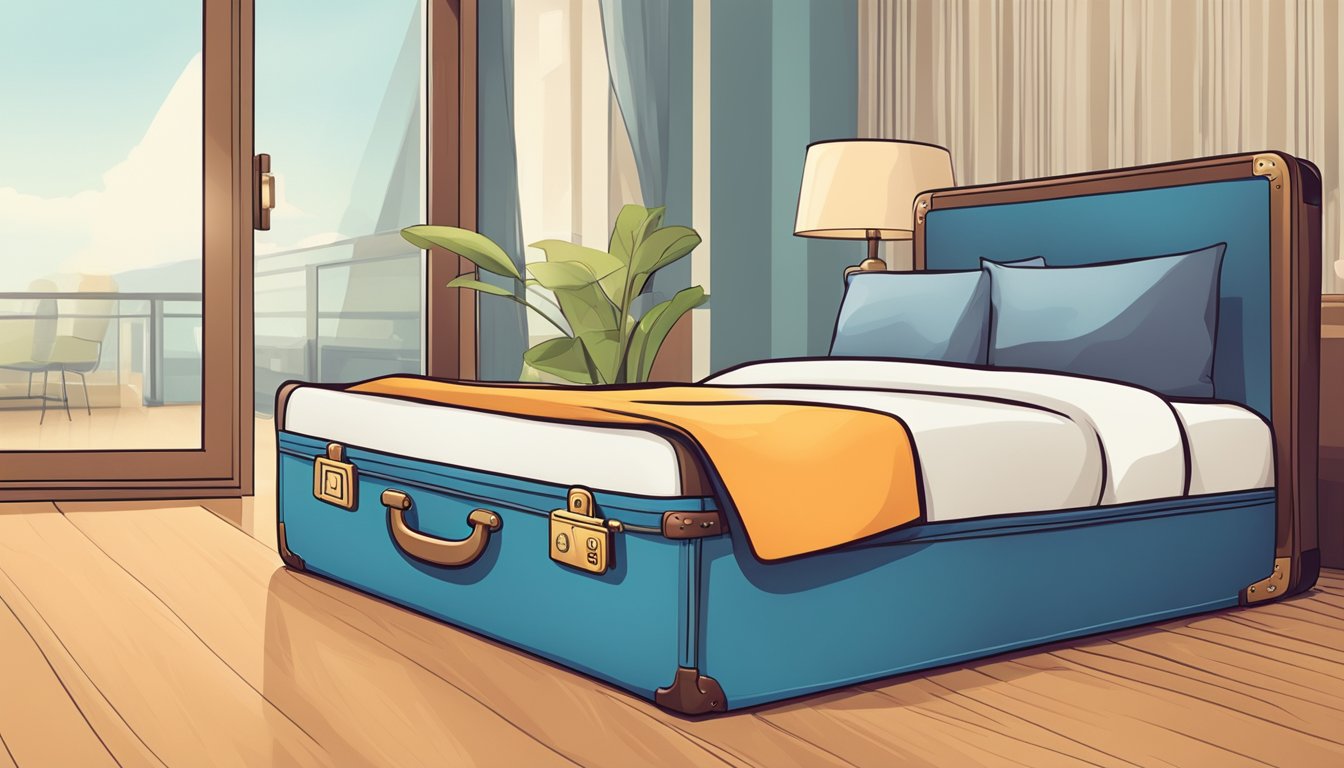
When travelling, choosing secure accommodation is a top priority. Here are some tips to help you stay safe in your hotel or hostel.
Choosing Secure Hotels and Hostels
When booking your accommodation, do some research to ensure that the hotel or hostel has good security measures in place. Look for properties that have security cameras, secure entrances, and 24-hour front desk staff. Check online reviews to see if other travellers have had any security issues at the property.
Room Safety Measures
Once you arrive at your accommodation, take some precautions to keep your belongings safe. Use the in-room safe, if available, to store your passport, cash, and other valuables. If there is no safe in the room, ask the front desk if there is a secure storage area where you can store your belongings.
Consider bringing a combination lock to secure your luggage and prevent theft. You can also use a portable door lock to add an extra layer of security to your room.
Interacting with Staff and Guests
When interacting with staff and guests at your accommodation, be cautious and aware of your surroundings. Avoid sharing personal information with strangers, especially if they seem overly curious or pushy.
If you notice any suspicious behaviour from staff or guests, report it to the front desk immediately. Trust your instincts and don’t hesitate to ask for help if you feel unsafe.
By following these tips, you can help ensure that your accommodation is a safe and secure place to stay during your travels.
Tech Security
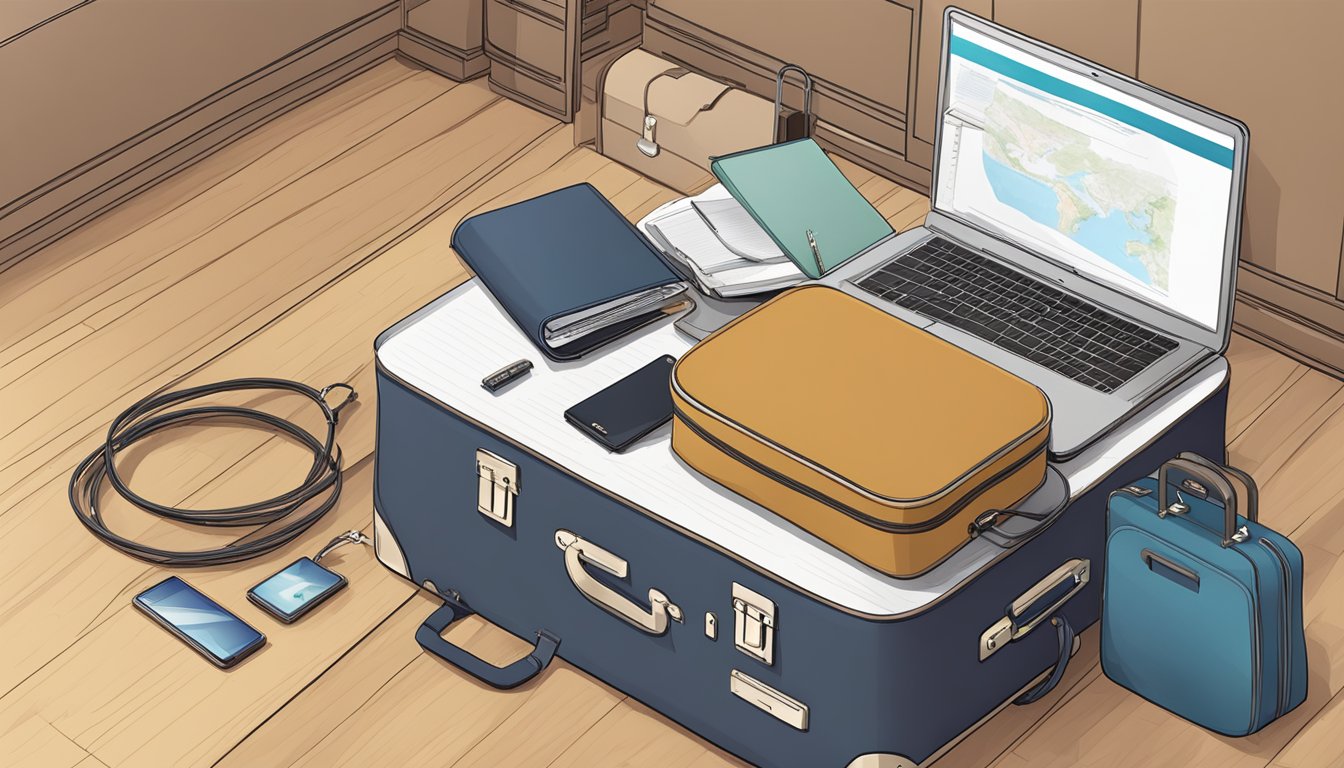
Travelling with electronic devices such as laptops, smartphones, and camera memory cards can make your trip more convenient. However, it can also put your personal and sensitive information at risk if you’re not careful. Here are some tips to help you protect your electronic devices and data while travelling.
Protecting Electronic Devices
Your electronic devices are valuable and can be easy targets for theft. To protect them, you should always keep them with you or in a secure place. When you’re not using them, keep them in a locked safe in your hotel room or in a secure locker at a hostel. If you need to leave them in your car, make sure they are out of sight and locked in the trunk.
Another way to protect your electronic devices is to use a cable lock. A cable lock is a small, portable lock that you can use to secure your laptop or other electronic devices to a fixed object, such as a desk or table. This will prevent someone from stealing your device when you’re not looking.
Data Safety While Travelling
Your electronic devices contain a lot of personal and sensitive information, such as your passwords, bank account details, and personal photos. To protect this information, you should take some precautions before and during your trip.
Before you leave, make sure you have a backup of all your important data. This can be done using an external hard drive or a cloud storage service. This way, if your device is lost or stolen, you can still access your data from another device.
You should also enable storage encryption on your devices. This will protect your data from being accessed by someone who doesn’t have the password. Most modern devices come with built-in encryption, but you may need to enable it manually.
When you’re travelling, you should also avoid using public Wi-Fi networks as much as possible. These networks are often unsecured, which makes it easy for hackers to intercept your data. If you need to use public Wi-Fi, make sure you use a virtual private network (VPN) to encrypt your data.
In Case of Emergency
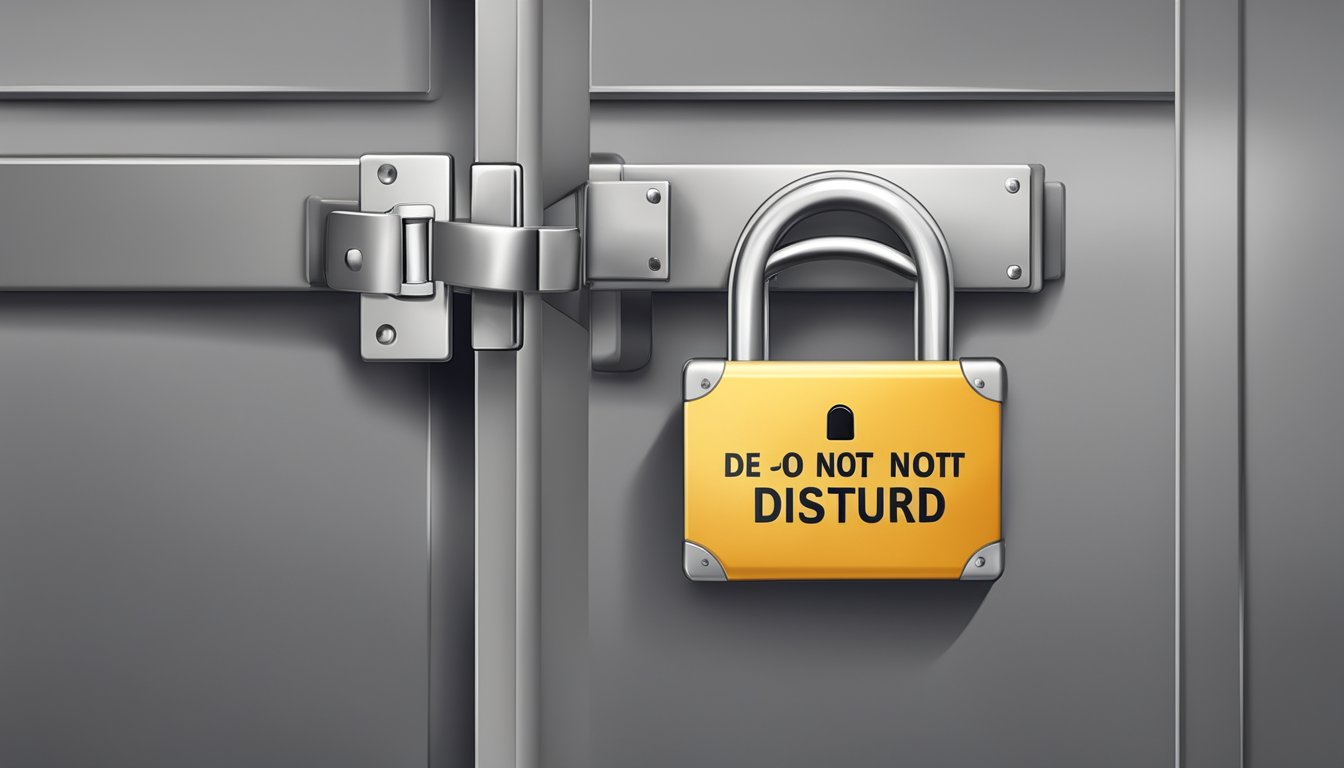
Travelling can be unpredictable, and sometimes, despite your best efforts, things can go wrong. In case of an emergency, it’s important to have a plan in place to protect your belongings and stay safe.
What to Do If Items Are Stolen
If your items are stolen, it’s important to act quickly. First, report the theft to the local authorities and get a police report. This will be important for insurance purposes. Next, cancel any credit or debit cards that were stolen and contact your bank to report the theft. Keep a list of cancellation numbers handy in case you need to make a report quickly.
If your passport was stolen, contact your embassy or consulate immediately to report the theft and get a replacement. It’s also a good idea to have a copy of your passport stored in a safe place, such as a hotel safe or with a trusted friend.
Keeping Contacts and Resources Handy
It’s always a good idea to have a list of important contacts and resources with you when travelling. This can include the phone numbers for your bank, embassy or consulate, and travel insurance provider. Keep this list in a safe place, such as a hotel safe or in a password-protected digital document.
Guidebooks and websites such as TripAdvisor can also be helpful resources in case of an emergency. These resources can provide information on local hospitals, police stations, and other important services. Keep a guidebook or print out important information from TripAdvisor to have on hand in case of an emergency.
Remember, staying calm and having a plan in place can help you stay safe and protect your belongings in case of an emergency while travelling.
Frequently Asked Questions
What are the best ways to secure your luggage on international journeys?
When travelling internationally, it’s important to secure your luggage to prevent theft or loss. The best ways to secure your luggage include using TSA-approved locks, wrapping your luggage in plastic wrap, and using luggage tags to identify your bags. Additionally, it’s a good idea to keep your valuables with you in your carry-on bag.
How can you ensure your personal items are protected during your travels?
To ensure your personal items are protected during your travels, it’s important to keep them with you at all times. This includes your passport, wallet, phone, and other important documents. You should also keep your bags close to you and avoid leaving them unattended.
What strategies can you use to safeguard your wallet while on the move?
To safeguard your wallet while on the move, you should keep it in a secure pocket or bag that is close to your body. You should also avoid carrying large amounts of cash and instead use credit cards or traveller’s cheques. Additionally, it’s a good idea to keep a record of your credit card numbers and contact information in case they are lost or stolen.
What measures should you take to keep your backpack secure while exploring new places?
When exploring new places, it’s important to keep your backpack secure to prevent theft. You should always keep your backpack with you and avoid leaving it unattended. Additionally, you can use a backpack lock or a cable lock to secure your backpack to a fixed object.
Can you recommend any effective methods for protecting valuables in hotel rooms?
To protect your valuables in hotel rooms, you should use the room safe if one is available. If there is no safe, you can use a portable safe that can be locked to a fixed object in the room. Additionally, you should keep your valuables out of sight and avoid leaving them in plain view.
What are some essential tips for carrying and protecting valuables when travelling?
Some essential tips for carrying and protecting valuables when travelling include keeping them with you at all times, using a money belt or hidden pocket for cash and important documents, and avoiding carrying large amounts of cash. You should also keep a record of your credit card numbers and contact information in case they are lost or stolen.
Applying for Loans Just Got Easier with Quick Credit
Do rising expenses leave you feeling strapped? Perhaps you dream of a getaway or the latest tech. Whatever your reason, a personal loan can bridge the gap.
Quick Credit, a trusted Jurong moneylender, streamlines the process. In just minutes, you can apply for a personalized loan online.
Take Control of Your Finances Today
Applying is simple. You’ll need:
- NRIC/Work Pass
- Recent Paystubs (3 Months)
- CPF Statements
- Proof of Address
Don’t let unexpected bills hold you back. Get started with Quick Credit and breathe easy.
Click here to apply online today.
